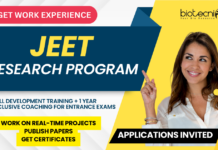Top 12 Questions Asked During PhD Interview & How to Answer Them
A Ph.D. Interview freaks out a lot of candidates. They often struggle thinking what all questions will be asked and how he or she should prepare oneself. PhD Interview format and the type of questions asked vary with institutes. You may be called for a one-on-one interview with your potential supervisor in person or via Skype. Most of the institutes follow a formal interview format which is conducted in front of a panel, and you can be asked to give a presentation to the department. Rarely you will be called for an informal chat with your potential supervisor and their students over lunch. Regardless of the type of interview and level of formality, you must do your homework and prepare for the interview. Of course, you cannot predict the specifics of the questions that they will ask you, but certain topics are almost inevitable. As per our survey, below we have tried to accumulate a set of Q&A, Top 12 Questions Asked During PhD Interview & How to Answer Them. Lets Dive In!
Q1. Tells Us Something About Yourself or Give a Brief Introduction about yourself!
Ans: You
will say now this is a common question, everybody can answer it. Wrong! The first impression is the last impression! Obviously, this will be the first question in a PhD Interview and almost 70% of candidates handle this question in a wrong manner.Appearance – This is the most important attribute of an interview. One should be dressed up properly as it shows that you’re paying attention to the details and care about making the right impression. Truly said by someone, What you wear is a part of who you are! Hence use it to communicate your personality. Keep the focus on you by avoiding flashy accessories and extravagant attire. Be simple.
How to Start – How you pitch your first line matters. The intensity of your voice & the choice of words matters. Plan on the first few speaking moments of your introduction beforehand. Confidence is equally important as your appearance. To establish a solid foundation, boldly state your name. Don’t be afraid to speak up. A solid volume shows you’re confident and that you are excited about the opportunity.
Here’s an example that someone applying for a Biotechnologist position might use:
“My name is Anurag and I’m a passionate plant biotechnologist with over five years of research experience specializing in somatic embryogenesis and haploid culture. I’m looking forward in growing my technical and research skills to develop and inspire a thought of my own.” Customize it further as per your & the post requirement and Bingo! You will have a great start!
________________________________________________________________________
Q2. What do you plan to do after you complete your PhD?
Ans: Strategically answer to this question. Start with “I am really excited to do my PhD in this subject, this has been my topic of interest since my masters, after exploring it further during my PhD that too in this institute, I am sure I am going to like it even more, so definitely at this point of time i am willing to pursue my postdoctoral studies after PhD to broaden my horizons further. I would even like to take up an opportunity if it comes by to serve myself as a professor, rendering my knowledge to our future assets.”
Above answer is just an example to give you an idea about how excatly the flow of your statemnet should be. Analyze first what are your future plans and then frame your answer accordingly.
________________________________________________________________________
Q3. What do you think are your strengths and weaknesses, can you highlight them?
Ans: The best way to answer this tricky question is to keep the job description in mind and then tread cautiously. Do not speak your heart out. Be specific and to the point.
Speak about your strength in conjunction to the Job requirement. For example, if the job revolves around a lot of team projects, in that case, you might say that you are a great team worker and clear communicator who can work with diverse groups of people.
While addressing your weaknesses, avoid pointing out weaknesses that would make you unfit for the job. For example, if the job requires a lot of skills technical skills on handling R&D equipment, do not say that your weakness is technology. Also, no matter what weakness you select, show a positive side to it. Like you are working on your particular weakness rigorously and it will never reflect in your work.
Q4. Any type of training you are planning to take up during or after of your PhD?
Ans: The answer to the above questions can be given in the below way:
“Yes, definitely Sir/Madam, some training/workshops or hands-on technical skill development programmes are on my top priority list which I am planning ahead of my Ph.D. I have learned that major biotech and biopharma companies in spite of having an appropriate academic degree and academic qualifications overall, new graduates were hired for less than 15% of all available entry-level job openings. Later I understood that Transferable job skills are a major issue among new PhDs. If I can somehow minimize this skill gap I feel it will be beneficial for me.”
Q5. Why are you choosing this particular project?
Ans: Say that “According to me, this project is much related to my prior work knowledge and it will be easier for me to connect with the current project and provide fruitful results. Moreover, I want to expand and extend my thought of research to a higher level and this project will be the best platform for me.”
By now you must be knowing some specifics of the project you are going to work on, pick up keywords and frame your answer around it. This question is generally asked in order to check how passionate you are about the subject.
Q6. What makes you the right candidate for this PhD?
Ans: I am a self-motivated person who is willing to give 100% in the project. If I am selected for this PhD not only I will implement my existing knowledge but will also be open to exploring advanced techniques. I hold a lot of experience & hands-on exposure in ‘Plant tissue Culture lab’ (For example) as I had Plant Biotechnology as my special paper in my masters and post Msc I have worked as a project assistant for 2 years ( Supposed) in a lab. The requirements of this project and the prior knowledge I have suggests that I will be a perfect fit for it. So for sure Sir/Mam I can bring my successes and experiences to my PhD work here.
Q7. What difficulties do you expect to encounter during this project?
Ans: This question has been the most common & an important part of most of the Biotech PhD interviews. This question can be thrown at you either in the beginning while you are talking about your strength & weakness or during the time you explain to them about your post PhD plans. Tackling this question perfectly can be a key to your selection in the PhD Interview.
As an answer to this question you can cite: “I per my understanding in order to start with the project I need to go through the existing archived research records, hence those should be easily accessible, also easy access to the labs for conducting studies, proper SOP’s in place are the major things I am concerned of which I am sure will definitely be taken care of here, without even me asking for it. (Say it with a confident smile ). The most common crisis I feel we will have to face is a shortage of required sample & chemicals if that can be taken care of, it will help us accelerate our work.”
I can understand you will be very much tempted to speak about fund crisis as one of the major challenges you will face, but mentioning this point in the first meet is not advisable. Analyze the members in the interview panel and then take up this point.
Q8. What would you like the impact of this project to be?
Ans: The answer for this may vary from person to person depending on the type of project you are getting into.
For example, if you are getting into a cancer-related project, say that ” Intense research is being done on this topic worldwide. Advancements are there yet nothing breakthrough. I would like to take this project in a direction where not only we focus & analyze areas untouched, but also it yields a prominent result. I would put my every possible effort & knowledge to come out with some breakthrough research which could save the mankind from Cancer.
If you are getting into hardcore Biotech research cite that: “As my work will be mostly around biotechnology, which is an applied branch of science, I hope to provide some economic benefits to the biotech industry globally and moreover, I’m keen to share my passion for this subject with a wider audience.
________________________________________________________________________
Q9. How are you planning to fund this project?
Ans: Questions related to funding are asked in interviews concerned with non-funded PhDs. In case you have a fully funded PhD, you might still be asked about contingency plans if funding falls through or the project is overrun due to some unforeseen circumstances.
You can reply by saying: “In case of a funding issue my first step will be to short-listed external funding agencies who will be willing to fund in our project. If needed I can work part-time, earn in some extra bucks without hampering my major project work, just to fund the project temporarily until the fund crisis is resolved. I would never like the project to stop abruptly, will do whatever in my hands to support the project.”
________________________________________________________________________
Q10. Why you want to do your PhD from this University ?
Ans: To answer this question you have to come prepared. Discuss what you really understand more about its own particular R&D Department and the university. Discuss how this University will be able to assist you and the way they’re much better than the others. Describe how you will be able to bring about their endeavors and you’d love to study & grow with the supervisors assigned.
In short, a simple answer to this question can be given as :
I have looked at plenty of chances in this area. I feel this project is best among one of its kind, combining a research angle that is exceptional with a training module that will meet my professional needs. I was already familiar with the job of my potential supervisor and their study has greatly influenced my knowledge development. A combination of my skills aided by the guidance of my supervisor along with the universities extremely advanced infrastructure at the display I assure you this project will be a hit.
________________________________________________________________________
Q11. What can you bring to this research group?
Ans: “I’ll be honored if I could be part of the research team and will attempt to bring huge development in Research Quality. I have learned plenty of technical skills in past work experience and it’s going to be a terrific opportunity for me to execute exactly the exact same inside this study group. I also mean to publish my own research work in cooperation with my teammates in impactful & renowned journals. Moreover, I would love to teach my juniors along with my group mates using whatever abilities and understanding I have accumulated till date in my experience.”
Q12. If you repeatedly get negative results in your project, what will you do?
Ans: “Sir/Madam repeated negative consequences is a symptom of a new study measurement and may contribute to some fresh ideas respective to our scope of the study. I have also learned about this a group of journals that have been specially designed to release the ‘rejects’ for example the Journal of Negative Results in Biomedicine. May more such journals exist. Negative findings can also be progressively represented in broad-scope journals like Disease Models & Mechanisms and PLoS ONE. So sir/mam I believe one ought to keep high trust and soul on adverse results instead of becoming a pessimist.”
So here we are with Top 12 Questions Asked During PhD Interview & How to Answer Them. In this piece, we have tried to enlist most common questions that are asked during PhD interviews. The above answers are just a suggestion meant to guide you, give you an idea on what kind of answers exactly the interviewers expect from you and how you should frame your answers smartly in order to get through the selection process.
 This article has been contributed by Priyanjana Ghosh, Senior Professor at Biotecnika with specialization in Plant Biotechnology. She has been an ardent follower of trends pertaining to PhD degree in India. She has immense knowledge about the process & procedures followed in PhD admissions. We thank her for her valuable inputs. More such discussions will be published in future on Biotecnika by her.
This article has been contributed by Priyanjana Ghosh, Senior Professor at Biotecnika with specialization in Plant Biotechnology. She has been an ardent follower of trends pertaining to PhD degree in India. She has immense knowledge about the process & procedures followed in PhD admissions. We thank her for her valuable inputs. More such discussions will be published in future on Biotecnika by her.Do let us know your views by commenting below. Also, do let us know if you have any question or topic in your mind which you feel we must answer & cover it on our website which would help a lot of students.
Read Also:
































Extremely useful .Thanks
Its indeed a great article to give a view point about the potential interview questions a candidate must have in mind while preparing for a phd interview. My question is suppose a person has plans to join an R&D organisation or industry after Phd then how one should answer question 2?
Thank you Dr. Ghosh. Your article seems a great source of confidence booster in nervous conditions like PhD interview. Appreciate your share.